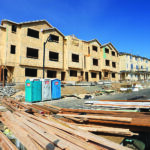
Rent Control Will Kneecap Our Best Tool to Lower Housing Costs
From the Twin Cities in Minnesota, to the metropolises of Europe, Asia and Africa, rent control has devastated new apartment construction, studies and experience show.

From the Twin Cities in Minnesota, to the metropolises of Europe, Asia and Africa, rent control has devastated new apartment construction, studies and experience show.

She has a chance to look magnanimous in an increasingly heated tax dispute between City Hall and office tower owners. Instead, she’s digging in.

Is this truly a serious effort by the Wu administration to overcome stiff opposition and get its controversial plan over a big legislative hurdle?

Ads and harsh warnings won’t be enough to convince voters to turn away from rent control. Industry and sympathetic politicians will need to show voters a better world, first.

It’s that time of year again, when we recognize the dumb ideas, political cowardice and dodo development plans that add a little extra spice to life in Massachusetts.

Voters are boiling over with frustration as costs escalate in almost every segment of their lives. Will they go for rent control, or new construction as the solution to housing costs?

We all agree Massachusetts needs more housing. To get there, do we need a shinier, more tempting carrot, a bigger stick or something in between?

America has become NIMBY Nation, and Massachusetts, where even plans for a two-bit apartment building will draw warnings of environmental doom, is its spiritual heartland.

The latest idea from a city pol to head off spending cuts: pile more taxes on the backs of apartment owners. But even a mayoral ally worries it’s a bad idea.

Instead of arguing over how many homes we’re building, we should measure success by how much we can bring down home-sale prices and rents.

For years, cities and towns across the nation seized homes and properties for back taxes and then sold them off for hundreds of thousands of dollars, pocketing the gains.

A steady stream of remote workers fled Boston for rural New England during the pandemic. It’s helped the Pioneer Valley become one of the nation’s hottest housing markets.

Gov. Maura Healey claims we’re already almost halfway to hitting our 2035 housing goal. Is it real progress, or just happy talk from a governor facing reelection?

The HYM Investment Group chief faces down a tough financing environment and a threat from a prominent politician to force an eminent domain sale of the Suffolk Downs development site.

Boston, Worcester and Springfield may be the Bay State’s three largest cities, but if Congressman Jake Aucincloss has his way, they may get competition.

Say what you want about Josh Kraft – and there’s certainly a lot to say. But he pushed Boston Mayor Michelle Wu on issues where the city’s failing.

Massachusetts is at a high risk of recession and may already be in the early stages of a contraction. Is this really the time for green virtue-signaling?

The Bay State’s life sciences sector now faces the prospect of a potential retrenchment amid slashing cuts to research funding and drops in venture capital funding.

State Revenue Commissioner Geoffrey Snyder said he can’t “substantiate” claims that Boston raised taxes on tower owners who challenged their valuations. A lawsuit could be next.

The next big thing in housing affordability isn’t coming from Gov. Maura Healey or a leading legislator. Instead, a housing scholar is taking matters into his own hands.